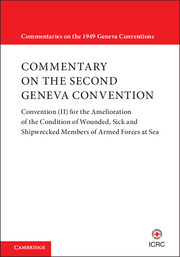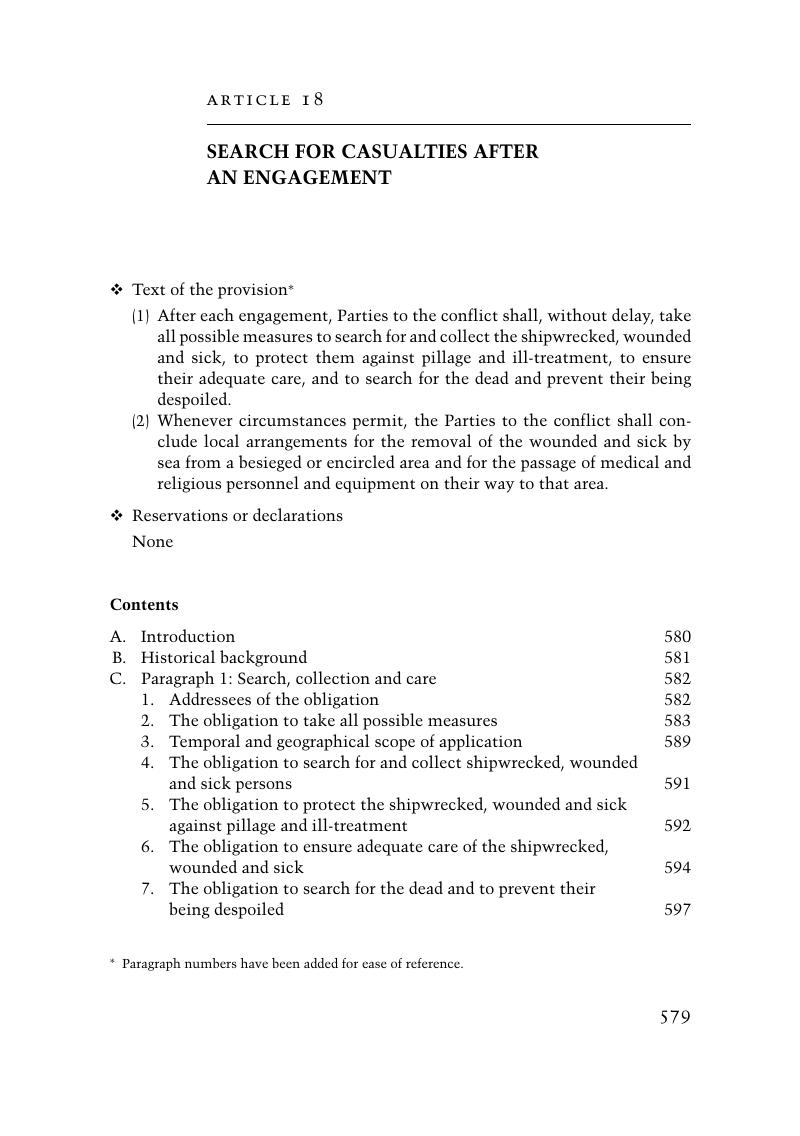 Commentary on the Second Geneva Convention
Commentary on the Second Geneva Convention Book contents
- Commentary on the Second Geneva Convention
- Commentary on the Second Geneva Convention
- Copyright page
- Contents
- Foreword by Peter Maurer
- Acknowledgements
- Abbreviations
- Introduction
- Preamble
- Chapter I General Provisions
- Chapter II Wounded, Sick and Shipwrecked
- Article 12 Protection and Care of The Wounded, Sick and Shipwrecked
- Article 13 Protected Persons
- Article 14 Handing Over of Wounded, Sick and Shipwrecked to a Belligerent
- Article 15 Wounded, Sick and Shipwrecked Taken on Board a Neutral Warship or Neutral Military Aircraft
- Article 16 Status of the Wounded, Sick and Shipwrecked Who Have Fallen into Enemy Hands
- Article 17 Wounded, Sick and Shipwrecked Landed in a Neutral Port
- Article 18 Search for Casualties after an Engagement
- Article 19 Recording and Forwarding of Information
- Article 20 Prescriptions Regarding the Dead
- Article 21 Appeals to Neutral Vessels
- Chapter III Hospital Ships
- Chapter IV Personnel
- Chapter V Medical Transports
- Chapter VI The Distinctive Emblem
- Chapter VII Execution of the Convention
- Chapter VIII Repression of Abuses and Infractions
- Final Provisions
- Testimonium and Signature Clause
- Sources
- Index
- References
Article 18 - Search for Casualties after an Engagement
from Chapter II - Wounded, Sick and Shipwrecked
Published online by Cambridge University Press: 30 November 2017
- Commentary on the Second Geneva Convention
- Commentary on the Second Geneva Convention
- Copyright page
- Contents
- Foreword by Peter Maurer
- Acknowledgements
- Abbreviations
- Introduction
- Preamble
- Chapter I General Provisions
- Chapter II Wounded, Sick and Shipwrecked
- Article 12 Protection and Care of The Wounded, Sick and Shipwrecked
- Article 13 Protected Persons
- Article 14 Handing Over of Wounded, Sick and Shipwrecked to a Belligerent
- Article 15 Wounded, Sick and Shipwrecked Taken on Board a Neutral Warship or Neutral Military Aircraft
- Article 16 Status of the Wounded, Sick and Shipwrecked Who Have Fallen into Enemy Hands
- Article 17 Wounded, Sick and Shipwrecked Landed in a Neutral Port
- Article 18 Search for Casualties after an Engagement
- Article 19 Recording and Forwarding of Information
- Article 20 Prescriptions Regarding the Dead
- Article 21 Appeals to Neutral Vessels
- Chapter III Hospital Ships
- Chapter IV Personnel
- Chapter V Medical Transports
- Chapter VI The Distinctive Emblem
- Chapter VII Execution of the Convention
- Chapter VIII Repression of Abuses and Infractions
- Final Provisions
- Testimonium and Signature Clause
- Sources
- Index
- References
Summary

- Type
- Chapter
- Information
- Commentary on the Second Geneva ConventionConvention (II) for the Amelioration of the Condition of Wounded, Sick and Shipwrecked Members of Armed Forces at Sea, pp. 579 - 606Publisher: Cambridge University PressPrint publication year: 2017
